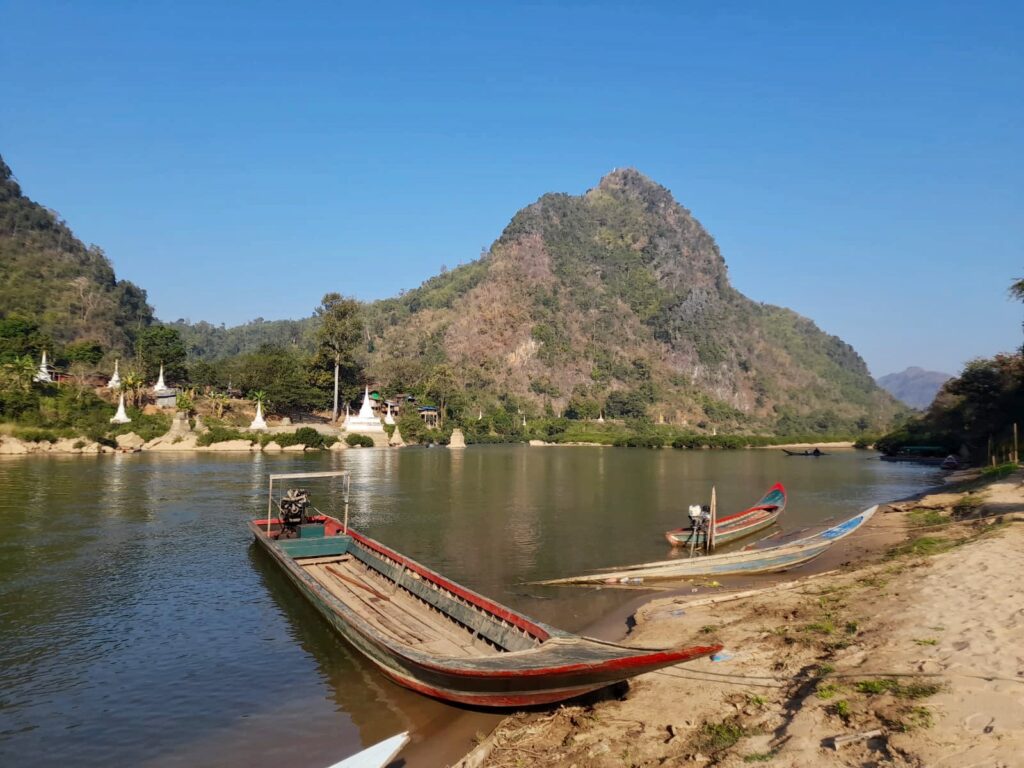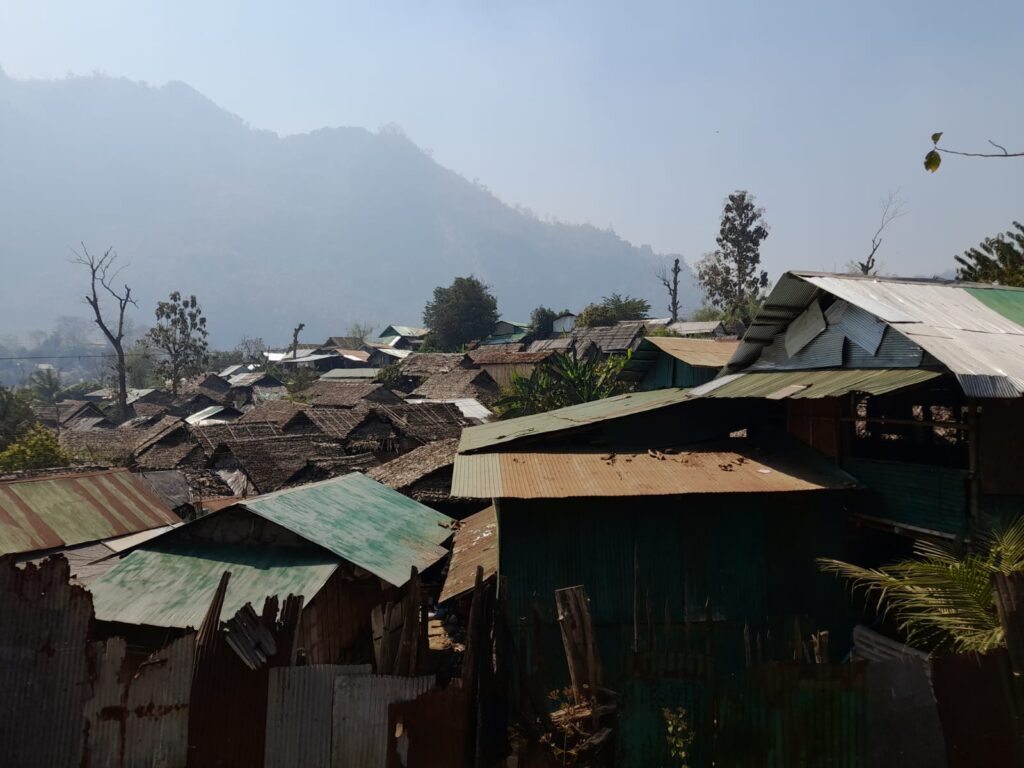By: Sahana David Menon and Daniel Rucka
Twitter: @the_news_21
Southern Shan State, Myanmar: On March 11, 2023, a deadly attack on a Buddhist monastery in the village of Nai Neint, in Myanmar, has led to renewed conflict and displacement of civilians. The attack claimed the lives of 33 civilians including three monks.
According to local authorities, the attack was carried out by an armed group known as the Karenni Nationalities Defense Organization (KNDO). However, the KNDO has denied responsibility for the attack, instead claiming “They (the military) made them line up in front of the monastery and brutally shot them all, including the monks”.

picture credit : Daniel Rucka
The Myanmar military Junta dismissed this accusation and issued a statement reports to the contrary, spokespersons for the junta have claimed that those who lost their lives were not innocent bystanders, but rather members of armed groups involved in supplying weapons to anti-coup rebels.
This statement was made during a broadcast on the state-owned Myawaddy television channel. The location of the incident is considered to be of critical importance due to its role in the supply chain of weapons to those who are opposed to the current regime.
The incident has led to renewed conflict in the region, with clashes between Myanmar security forces and armed groups. This situation has led to an influx of refugees across the Thai-Myanmar border, with many seeking safety in Thailand. The United Nations High Commissioner for Refugees (UNHCR) has expressed concern over the situation, noting that it has led to an increase in the number of refugees crossing the Thai-Myanmar border in recent days.

Picture credit: Daniel Rucka.
According to local residents, two individuals were killed, including a 70-year-old displaced man, by troops belonging to the Junta in Myaung township, Sagaing on March 14. The Junta troops have been conducting raids in various villages of Myaung since March 12, leading to the displacement of around 4,000 residents from their homes.
According to the UNHCR, there are already over 100,000 refugees from Myanmar living in camps along the Thai border, many of whom have been displaced by previous rounds of conflict and persecution. The recent attack on the monastery and the resulting displacement of civilians have only added to the ongoing humanitarian crisis in the region.
The Thai-Myanmar border has become a flashpoint in the ongoing conflict in Myanmar, with refugees fleeing violence and persecution crossing into Thailand in increasing numbers. While Thai authorities have provided some support to these refugees, concerns are mounting about the impact of the influx on local communities and the broader political situation in the region.
The Thai government has set up temporary shelters to accommodate the refugees and has provided some assistance, including food and medical care. However, many refugees remain in limbo, uncertain about their future and facing difficult conditions in the camps.

Picture credit: Karenni Nationalities Defense Force
Dr Thitinan Pongsudhirak is a political scientist and a speaker associate professor at faculty of political science at the university of Chulalongkorn University in Bangkok, Dr. Pongsudhirak said that the situation at the Thai-Myanmar border is complex and multifaceted, with political, economic, and humanitarian factors all playing a role. The ongoing conflict in Myanmar, which has seen the military crackdown on pro-democracy protests and targeted violence against minority groups, has created a refugee crisis that is spilling over into neighbouring countries like Thailand.
At the same time, the economic impact of the pandemic has worsened the situation, with many refugees unable to find work or support themselves and their families. This has put a strain on local communities and raised concerns about the potential for social unrest.
“The situation at the Thai-Myanmar border is a humanitarian crisis, but it’s also a political and economic crisis,” said Dr. Thitinan Pongsudhirak. “There are no easy solutions, and it’s going to require a coordinated effort from governments, NGOs, and other stakeholders to address the underlying issues.”
Many activists and NGOs are calling for a more coordinated response from the international community, including increased aid and support for refugees and pressure on the Myanmar military to stop the violence and respect human rights. Some are also calling for a more robust response from the Thai government, including greater support for refugees and a more compassionate approach to those crossing the border.
However, there are concerns that the political situation in Thailand could complicate efforts to address the crisis. The Thai government has been criticized for its treatment of refugees and migrants in the past, and some fear that the current political climate could make it more difficult to provide assistance and support to those in need.
The temporary representative of the United Nations for Myanmar, Kyaw Moe Tun says “Band-Aid fix is never an answer”, urging the global community again to help Myanmar as “it’s not about choosing one political system over another. It’s about addressing the key threat to regional peace & security”.



buying clomid price generic clomiphene walmart how to get generic clomid price cost cheap clomiphene pills can i order generic clomiphene prices where buy generic clomiphene without prescription can i get clomid online
Facts blog you have here.. It’s severely to on strong status article like yours these days. I justifiably recognize individuals like you! Take guardianship!!
This is the description of glad I have reading.
order zithromax 250mg online – order zithromax without prescription flagyl 400mg over the counter
buy augmentin 375mg pills – https://atbioinfo.com/ acillin us
esomeprazole 40mg cheap – https://anexamate.com/ order esomeprazole 40mg pills
meloxicam 15mg uk – https://moboxsin.com/ mobic 15mg tablet
deltasone 5mg pills – aprep lson generic deltasone 5mg
medications for ed – medication for ed dysfunction buy erection pills
amoxil without prescription – amoxicillin oral amoxil oral
buy generic forcan for sale – https://gpdifluca.com/# order diflucan 100mg online
order lexapro 20mg – buy lexapro 10mg sale buy lexapro 20mg sale
oral cenforce 50mg – cenforce 100mg pill cenforce 50mg drug
cialis how long – cialis tadalafil 20mg price cialis is for daily use
cialis copay card – this generic cialis
zantac 300mg uk – https://aranitidine.com/ zantac 150mg brand
buy viagra 50mg – buy viagra order viagra online overnight delivery
Palatable blog you possess here.. It’s intricate to on elevated status script like yours these days. I truly respect individuals like you! Rent care!! https://buyfastonl.com/gabapentin.html
Greetings! Jolly gainful par‘nesis within this article! It’s the scarcely changes which choice obtain the largest changes. Thanks a portion in the direction of sharing! https://ursxdol.com/furosemide-diuretic/
With thanks. Loads of conception! https://prohnrg.com/product/metoprolol-25-mg-tablets/
Thanks an eye to sharing. It’s acme quality. https://aranitidine.com/fr/acheter-cenforce/
Đây đúng là content có tâm.
More posts like this would make the blogosphere more useful.
hyzaar for sale
More posts like this would add up to the online play more useful. http://furiouslyeclectic.com/forum/member.php?action=profile&uid=24578
buy dapagliflozin pills for sale – buy forxiga 10mg online cheap buy cheap dapagliflozin
order xenical online cheap – xenical price orlistat over the counter
Greetings! Jolly gainful advice within this article! It’s the petty changes which wish obtain the largest changes. Thanks a lot quest of sharing! http://www.orlandogamers.org/forum/member.php?action=profile&uid=29981
You can shelter yourself and your stock nearby being cautious when buying panacea online. Some pharmacy websites control legally and put forward convenience, secretiveness, rate savings and safeguards as a replacement for purchasing medicines. buy in TerbinaPharmacy https://terbinafines.com/product/risperdal.html risperdal
This is the amicable of topic I enjoy reading. TerbinaPharmacy
More articles like this would remedy the blogosphere richer.
搭载智能站群程序,自动化搭建与管理,为SEO项目提供核心驱动力。站群程序
kuwin sở hữu kho game đa dạng từ slot đến trò chơi bài đổi thưởng, mang đến cho bạn những giây phút giải trí tuyệt vời.